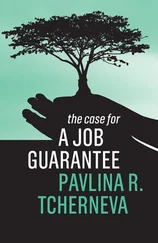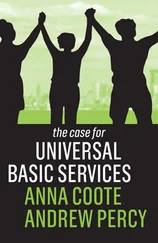Pavlina R. Tcherneva, The Case for a Job Guarantee
Anna Coote, Aidan Harper & Alfie Stirling, The Case for a Four-Day Week
The Case for a Four-Day Week
Anna Coote
Aidan Harper
Alfie Stirling
polity
Copyright © Anna Coote, Aidan Harper and Alfie Stirling 2021
The right of Anna Coote, Aidan Harper and Alfie Stirling to be identified as Author of this Work has been asserted in accordance with the UK Copyright, Designs and Patents Act 1988.
First published in 2021 by Polity Press
Polity Press
65 Bridge Street
Cambridge CB2 1UR, UK
Polity Press
101 Station Landing
Suite 300
Medford, MA 02155, USA
All rights reserved. Except for the quotation of short passages for the purpose of criticism and review, no part of this publication may be reproduced, stored in a retrieval system or transmitted, in any form or by any means, electronic, mechanical, photocopying, recording or otherwise, without the prior permission of the publisher.
ISBN-13: 978-1-5095-3966-6
A catalogue record for this book is available from the British Library.
Library of Congress Cataloging-in-Publication Data
Names: Coote, Anna, author. | Harper, Aidan, author. | Stirling, Alfie, author.
Title: The case for a four-day week / Anna Coote, Aidan Harper, Alfie Stirling.
Other titles: Case for a 4 day week
Description: Cambridge, UK ; Medford, MA : Polity Press, 2021. | Series: The case for | Includes bibliographical references and index. | Summary: “How a longer weekend can make us happier, healthier and greener”-- Provided by publisher.
Identifiers: LCCN 2020026325 (print) | LCCN 2020026326 (ebook) | ISBN 9781509539642 (hardback) | ISBN 9781509539659 (paperback) | ISBN 9781509539666 (epub)
Subjects: LCSH: Workweek. | Quality of work life. | Work-life balance. | Time management.
Classification: LCC HD5106 .C666 2021 (print) | LCC HD5106 (ebook) | DDC 331.25/722--dc23
LC record available at https://lccn.loc.gov/2020026325LC ebook record available at https://lccn.loc.gov/2020026326
The publisher has used its best endeavours to ensure that the URLs for external websites referred to in this book are correct and active at the time of going to press. However, the publisher has no responsibility for the websites and can make no guarantee that a site will remain live or that the content is or will remain appropriate.
Every effort has been made to trace all copyright holders, but if any have been overlooked the publisher will be pleased to include any necessary credits in any subsequent reprint or edition.
For further information on Polity, visit our website: politybooks.com
Many thanks to Eda Yazıcı for her extremely helpful additional research.
We are also grateful to the Communication Workers’ Union for supporting the New Economics Foundation’s work on a four-day week.
It is often said that ‘time is money’, but time is far more precious than that. Even if we don’t have money, we always have time. It’s a finite resource because we don’t live forever – and in that sense it’s all we’ve got, or all we can be sure of. How we experience our time and how much control we have over it are of the utmost importance to all of us.
Article 24 of the Universal Declaration of Human Rights (UDHR) states: ‘Everyone has the right to rest and leisure, including reasonable limitation of working hours and periodic holidays with pay.’ But what is ‘reasonable’ and how much ‘rest and leisure’ is enough? In this book we set out arguments for a four-day week because we think the world would be a better place – and our lives would be much improved – if we spent less time working for money and had more time at our own disposal.
Would that appeal to you? Here are just a few of the answers we might expect:
Yes, please! I’m totally worn out working five days a week.
Four days would be a lot better than no days at all. No thanks. I need more work, not less, to make ends meet.
I’d love more time off work, but not if it means less pay. I want more money to live a better life.
The boss wouldn’t stand for it. I’d end up trying to squeeze five days’ work into four.
So it’s not a simple proposition. And therefore the ‘four-day week’ in our title is shorthand for a more nuanced set of proposals. Our aim is to reduce the hours that anyone is obliged to work to earn a decent living – to four days or around 30 hours a week or the equivalent across a year. How people allocate their paid working time should be as flexible as possible to suit their own requirements. We don’t envisage a compulsory four-day week for all, but the gradual introduction of a range of measures to reduce working time in ways that benefit everyone by improving the quality of their lives. Throughout the following pages, we use the terms ‘a shorter working week’ or ‘reduced working time’ interchangeably to convey this idea.
It may mean a year’s worth of three-day weekends, or five ‘spare’ afternoons every week, or even a longer break if the extra hours can be banked and redeemed for a week or more at a time. You can spend this in any number of ways. You can look after your kids, visit your mum, hang out with your friends, study a course, run round the park, put up shelves, paint pictures, invent a new app, join a band or a campaign group, learn to dance, play the bazooka – you name it.
Most people like the idea of spending less time in paid work. UK surveys published in 2019 showed that 70 per cent of employees believe a four-day week would improve their mental wellbeing, 1and 64 per cent of businesses supported the idea of adopting a four-day week. 2Understandably, there’s more enthusiasm among employees if they anticipate no cut in take-home pay. 3But according to the Trades Union Congress, more than 3 million people in the UK would like to work fewer hours even if it would result in less pay, and 10 million people would like to work fewer hours overall. 4It’s not that people are work-shy. On the contrary, having access to decent work is closely linked to wellbeing and happiness. 5However, people want more time to use as they wish. You won’t find many who are longing to spend more hours at work, unless it’s to earn extra money (and we’ll come to that). Some have regrets about how they have led their life, but it’s rare to find someone who says ‘I wish I’d spent more time in the office’.
Yet there is a kind of collective addiction to long hours of hard graft, a belief that it’s good for us all and the only way to keep the show on the road. In a letter to The Times in November 2019, a retired consultant radiologist deplored the UK Labour Party’s pledge to introduce a four-day working week. The NHS had already been ‘brought to its knees’, she declared, by limiting the hours of junior doctors to 56 a week. A four-day week would seriously damage their education ‘and possibly sink the health service’. 6This may be an extreme case, but it illustrates the point that many of us have found it hard to imagine a satisfactory alternative to the status quo. Whether the working week lasts for 40 hours or much longer, what is ‘normal’ has usually been perceived as natural or inevitable and, by implication, right and irreversible. That’s a long way from the truth – and if anyone doubts that, just think how far the 2020 COVID-19 crisis disrupted everyday normalities in countries across the world.
Where did ‘normal’ come from?
Читать дальше












